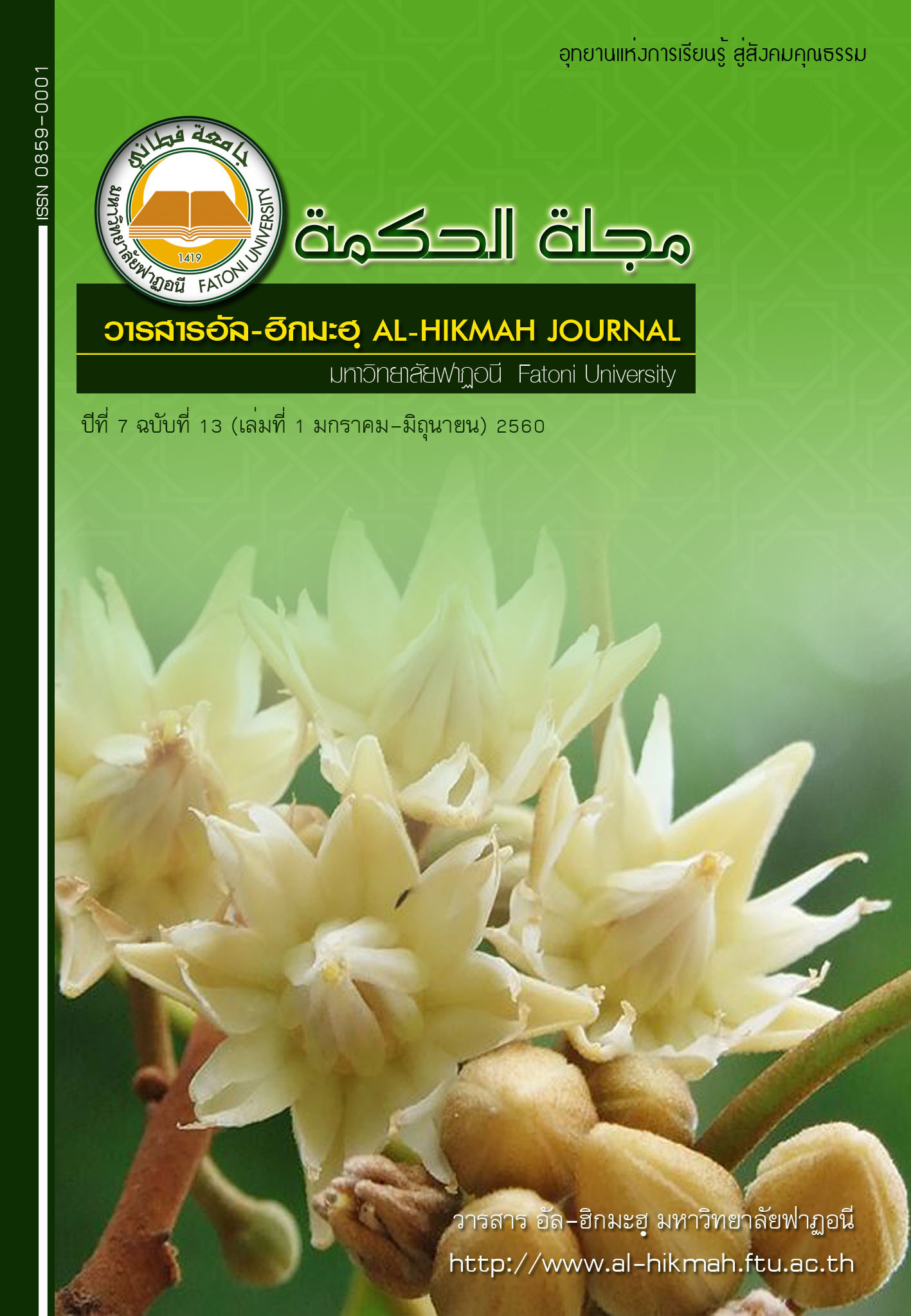การมีส่วนร่วมของผู้ปกครองในการจัดการศึกษาเพื่อส่งเสริมทักษะการคิดและการเรียนรู้ของเด็กมุสลิมในสามจังหวัดชายแดนภาคใต้
Keywords:
การมีส่วนร่วมของผู้ปกครองในการจัดการศึกษา, ทักษะการคิดและการเรียนรู้, ผู้ปกครองมุสลิม, เด็กมุสลิม, สามจังหวัดชายแดนภาคใต้Abstract
This research aimed to analyze parental involvement in education to develop thinking and learning skills of Muslim children in three southern border provinces. Participatory Action Research (PAR) was employed in this research using focus-group discussion technique. Fifty-one parents (Pattani 17 people, Yala 21 people, and Narathiwat 13 people) were purposively selected to participate in this study. It was found that parental involvement in education to develop thinking and learning skills of Muslim children involved 5 categories namely (1) parenting, (2) home-based learning, (3) collaborating with the school, (4) community involvement, and (5) self-Improvement and parental education. There were ten conditions related to the involvement, namely, (1) knowledge, (2) time, (3) family relationship (4) role model (5) continuity, (6) ICT skills, (7) commitment, (8) home environment, (9) parent-school relationship, and (10) parent-community relationship.
References
สุมน อมรวิวัฒน์. 2545. รายงานผลการดำเนินงานโครงการนำร่องระดับชาติ เรื่อง การปฏิรูปกระบวนการเรียนรู้ในโรงเรียนนำร่อง: รูปแบบที่คัดสรร. กรุงเทพฯ: เอสดีเคเปเปอร์แอนด์ฟอร์ม.
กระทรวงศึกษาธิการ. 2542. พระราชบัญญัติการศึกษาแห่งชาติพ.ศ. 2542. กรุงเทพฯ: โรงพิมพ์คุรุสภาลาดพร้าว.
Binkley, M., Erstad, O., Herman, J., Raizen, S., Ripley, M., Miller-Ricci, M., & Rumble, M. 2012. Assessment and teaching of 21st century skills. In P. Griffin, B. McGaw & E. Care (Eds.): Springer.
Blazer, C. 2005. Literature Review on Family Involvement: The Home-School Partnership. Suite: Miami-Dade County Public Schools.
Desforges, C., & Abouchaar, A. 2003. The impact of parental involvement, parental support and family education on pupil achievement and adjustment: a liturature reviews. Queen’s Printer.
Epstein, A. S. 2003. How Planning and Reflection Develop Young Children's Thinking Skills. Young Children, 58(5), 28-36.
Epstein, J. L. 2011. School, family, and community partnerships: Preparing educators and improving schools (2nd ed.). Suite: Westview Press.
Fisher, R. 2001. Philosophy in primary schools: fostering thinking skills and literacy. Reading, 35(2), 67-73.
Goodall, J., & Vorhaus, J. (2011). Review of best practice in parental engagement. UK: Department for Education (DFE).
Grose, M. 2008. Nurture your child’s thinking skills. Retrieved 28 November 2015, from Australia’s leading parenting educator http://holytrinity.act.edu.au/srcfiles/Thinking-Skills.pdf
Hornby, G. 2011. Parental involvement in childhood education: Building effective school-family partnerships: Springer Science & Business Media.
Hornby, G., & Lafaele, R. 2011. Barriers to parental involvement in education: An explanatory model. Educational Review, 63(1), 37-52.
KidsMatter. 2013. About thinking and learning. Retrieved 29 November 2015 http://www.kidsmatter.edu.au/
Kindon, S., Pain, R., & Kesby, M. 2007. Participatory action research approaches and methods: Connecting people, participation and place. NY: Routledge.
Kocyigita, S. 2015. Family Involvement in Preschool Education: Rationale, Problems and Solutions for the Participants. Educational Sciences: Theory & Practice, 15(1), 1-17.
McIntyre, A. 2007. Participatory action research (Vol. 52). California: Sage Publications.
Miles, M. B., & Huberman, A. M. 1994. Qualitative Data Analysis: an Expanded Sourcebook (2 ed.). Thousand Oaks: Sage Publication.
Nair, S., & Ngang, T. K. 2012. Exploring Parents’ and Teachers’ Views of Primary Pupils’ Thinking Skills and Problem Solving Skills. Creative Education, 3(01), 30.
Niia, A., Almqvist, L., Brunnberg, E., & Granlund, M. 2015. Student participation and parental involvement in relation to academic achievement. Scandinavian Journal of Educational Research, 59(3), 297-315.
Palys, T. 2008. Purposive Sampling. In L. M. Given (Ed.), The Sage encyclopedia of qualitative research methods Sage Publications.
Patrikakou, E. N. 2008. The power of parent involvement: evidence, ideas, and tools for student success. Illinois: Center on Innovation and Improvement.
Pena, D. C. 2000."Parent involvement: Influencing factors and implications". The Journal of Educational Research, 94(1), 42-54.
Redding, S. 1998. Parents and learning: International Academy of Education, UNESCO.
Shenton, A. K. 2004. Strategies for ensuring trustworthiness in qualitative research projects. Education for information, 22(2), 63-75.
Sui-Chu, E. H., & Willms, J. D. 1996. Effects of parental involvement on eighth-grade achievement. Sociology of education, 126-141.
Taneri, P. O. 2012. "Roles of parents in enhancing children’s creative thinking skills". International Journal of Human Sciences, 9(2), 90-108.
Wilder, S. (2014). "Effects of parental involvement on academic achievement: a meta-synthesis". Educational Review, 66(3), 377-397.



